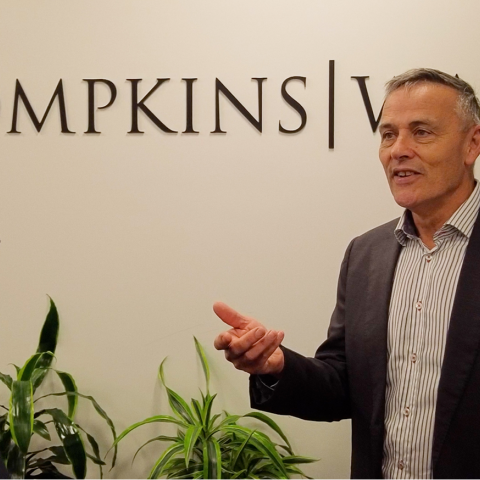Leaving a Lasting Legacy: An Interview with Lawyer Marcus Wilkins

For more than three decades, Tauranga lawyer Marcus Wilkins has been guiding clients through some of life’s most important decisions. As a partner at Tompkins Wake, Marcus has seen first-hand how the Acorn Foundation can help people create meaningful, lasting legacies in their community.
We sat down with Marcus to hear his perspective on why conversations about giving are so important, and how Acorn can provide a unique solution for clients who want their wealth to continue making a difference.
Introducing the Idea of Giving Back
When estate planning comes up, Marcus often starts by asking about his clients’ favourite charities.
“It’s often a discussion about what’s your favourite charity? You might already know enough about your client to say, ‘You’ve been supporting the air ambulance, or the SPCA, or another cause.’ That’s when you can introduce the idea of, rather than a one-off bequest, creating a lasting legacy.”
He’ll often frame it simply: “Do you want to leave something to your favourite charity? Have you thought about Acorn?”
A Story That Stands Out
One case in particular has stayed with him.
“A woman who had no children had settled in New Zealand years ago and wasn’t sure what to do with her money. Acorn was essentially the perfect solution because it meant there would be a lasting legacy for the community. That really resonated with her.”
Marcus says this is where Acorn really shines: “Clients without immediate family often struggle with what to do with their estates. Presenting them with the option of something enduring, rather than leaving it all to a nephew or distant relative, makes a real difference.”
Questions Clients Often Ask
Naturally, clients want to know the basics.
“Who’s behind Acorn? How long has it been running? How much are the admin costs?”
“People can be sceptical about giving to charity because they worry about where the money actually goes. Acorn has an advantage here — the trustees are volunteers, people with standing in the community, and that resonates with clients.”
Why Acorn Works
For Marcus, the key benefit is simple: Acorn keeps giving local.
“The ability to benefit your local community is huge. I also like the idea of the untagged option, and I try to encourage clients not to leave everything to just one charity. Leaving some untagged allows Acorn to distribute funds where they’re most needed.”
He adds: “The Vital Signs research means clients know their untagged gifts will be directed in a way that’s evidence-based and locally relevant. Keeping it local matters — and local people generally know best.”
What Community Means
Marcus’s own life reflects his philosophy. Over the years, he has volunteered on school boards, at sports clubs, in his church, and with groups like the Seafarers Mission and Stand Tall youth programmes.
“When you’ve been part of organisations like that, you want to see them continue to thrive and prosper. If they’re doing good, you want them to carry on. Having money is helpful for these groups, but it’s about more than that — it’s about keeping those connections alive.”
To Marcus, giving is simply a part of community life. “I don’t think about it as something special — it’s just what you do.”
A Call to Advisors
For Marcus, the takeaway is clear: professional advisors should be talking to their clients about legacy giving.
“It’s not a hard conversation to have. You’re helping people solve a problem — whether to pass it all on as a one-off bequest, or do something more meaningful with it for their community. When you put it that way, it just makes sense.”
At Acorn Foundation, we’re grateful to advisors like Marcus who open these conversations. They help ensure that generosity continues to flow into the Western Bay of Plenty, building stronger, more connected communities for generations to come.
